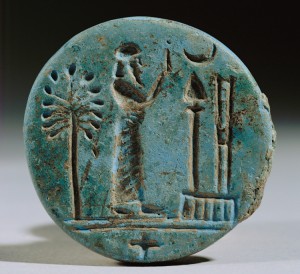Mythic Monday: Marduk of Babylon
July 24, 2017
This week’s Mythic Monday stars the great god Marduk, a major figure in ancient Babylonian mythology. He was the son of the god Ea, the Babylonian name for Enki, the Sumerian god of wisdom. The Sumerians ruled southern Mesopotamia, in what is now southeastern Iraq, before the Babylonians. The Babylonians adopted elements of Sumerian culture and combined old stories about the Sumerian gods with newer stories.

This clay seal shows a Babylonian priest in prayer in front of a spade, a symbol of the god Marduk. Marduk, originally a warrior-god of the city of Babylon, became the most important god in Mesopotamia. Credit: © Erich Lessing, Art Resource
Marduk originally was a warrior-god of Babylon, a great city on the banks of the Euphrates River. Babylon served as the capital of the ancient region of Babylonia and as a major religious center of the ancient world from about 1894 until 539 B.C. As Babylon emerged as the most important and powerful city in Mesopotamia, Marduk became the most important god of the area. He was called the “great lord, the lord of heaven and earth.” Babylonian stories describe how he rose to power, taking over the roles of many Sumerian deities. Marduk’s power was said to lie in his wisdom, which he used to help the good and punish the wicked. Some accounts describe him as having extra eyes, ears, or heads, and power over weather and wind.
A Babylonian creation tale describes how Marduk crafted an orderly universe as well as human beings following a battle in which he defeated the goddess Tiamat. The story tells how Tiamat, the saltwater goddess, and her mate Apsu, the fresh water god, coupled to produce what would become several generations of younger gods. The younger gods began to disrupt the tranquility of their elders, and so Apsu plotted to kill them. However, Tiamat and Apsu’s clever descendant Ea killed Apsu first and took his place. Tiamat then became angry and waged war against the other gods, who asked Ea’s son Marduk to be their champion. The other gods offered to submit to Marduk’s rule as king if he could defeat Tiamat.
Tiamat assembled an army of dragons and monsters led by the god Qingu, but Marduk overcame these fearsome forces. He commanded the wind to enter Tiamat’s mouth and puff up her body. He then killed her with an arrow that split her into two halves. With one half he created the heavens, and with the other, the Earth. Marduk also created the Euphrates and Tigris rivers, rain clouds, and mountains from Tiamat’s body. He set the cosmos working in an orderly fashion and ordered the gods to build a city—Babylon. Having also killed Qingu, Marduk used that god’s blood to create human beings as servants of the gods. Judging from such accomplishments, it is no wonder Babylonians held Marduk in such high regard.


